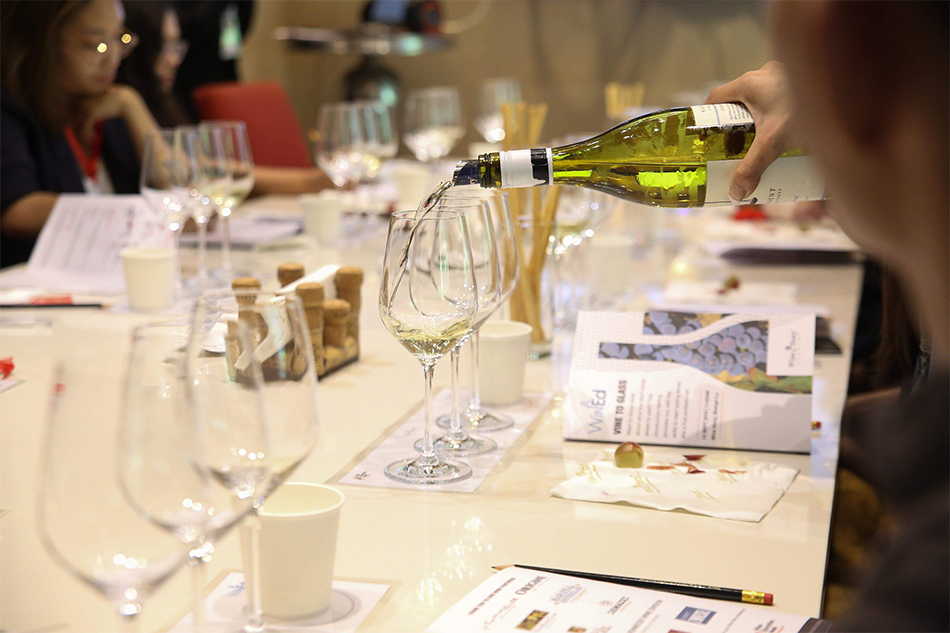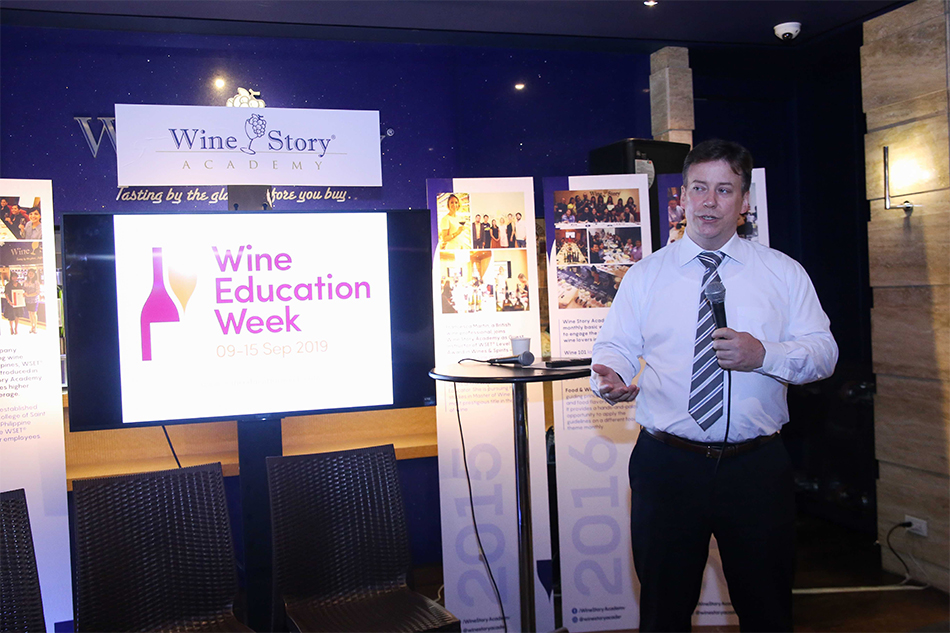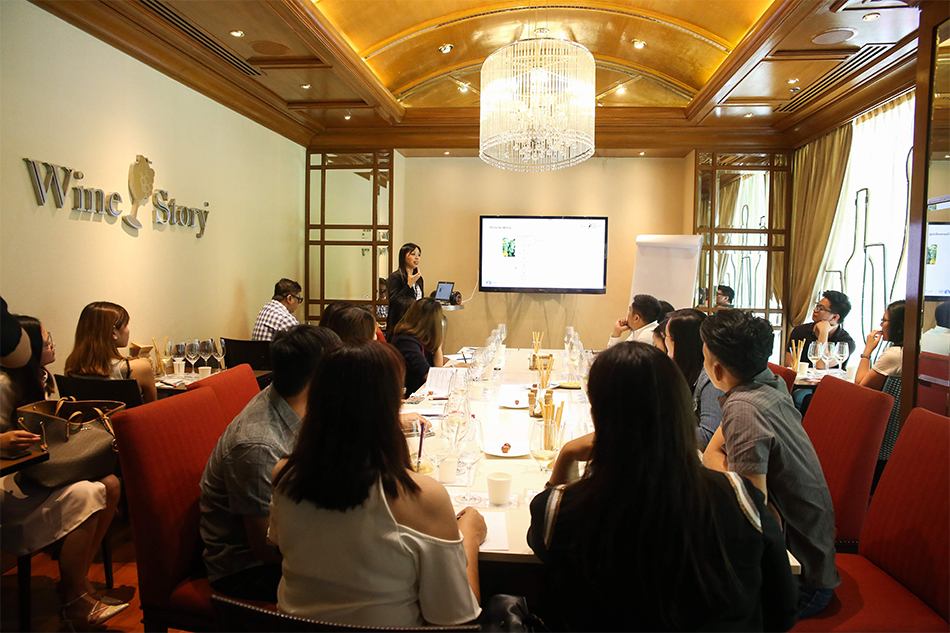Beyond the swirling and the sipping, this is how to take your love for wine to the next level
Marilen Fontanilla | Nov 1, 2019
A WSET diploma isn’t just for wine professionals, but it may actually get you thinking about becoming one.

Nineteen sixty-nine may be remembered as the year that man landed on the moon, but in a quiet corner in the United Kingdom, a landmark event changed the face of the wine hospitality trade with the foundation of the Wine & Spirit Education Trust (WSET). Fifty years later, WSET (pronounced with all the letters spelled out and not the shortcut W-SET) has been responsible for furthering the education in wines, spirits, and now sake for students who just can’t get enough of these liquid inspirations.
Jason Willis, WSET Business Development Advisor for Asia, was in town recently for the first Wine Education Week, which was held globally in 47 countries. ANCX caught up with him at Wine Story Academy, one of the Approved Program Providers in the country (the other being Enderun Colleges), and where the activities for Wine Education Week were being held.
I looked forward to meeting Willis, who is not only a WSET Certified Educator but also holds the revered WSET Level 4 Diploma. After joking about the humid weather in Manila, he explains, “Admittedly, 50 years ago, WSET’s purpose was to support the beverage industry, providing education for professionals… Over time, as qualifications and interest grew, we started to have lay people and novices want to take these courses. The market started to grow and that is where you see the different levels cater to the different markets.”

Jason Willis at Wine Story in Shangri-La Plaza during Wine Education Week.
From beginner to expert
Willis was not kidding when he mentioned that WSET caters to the diverse interests and needs of wine enthusiasts all over the world, as it offers four levels of certification.
The introductory Level 1 Award in Wines is intended for those just pursuing an interest or a career in wines (this is the fun level, according to Willis, which includes food and wine pairing). The intermediate Level 2 is more suitable for industry professionals and enthusiasts, as it explores the factors that impact style and quality. The advanced Level 3 delves deeper into a more detailed understanding of grape growing and winemaking, while the Level 4 Diploma is an expert level qualification covering all aspects of wine. Thankfully, there are no prerequisites to start each level, especially for those with some experience and background. “One just has to be open to learning and a willingness to have fun,” Willis candidly shares.

Over the years, WSET has had to evolve and adapt, such as piloting a new qualification for WSET Level 3 Award in Sake in 2014. Willis shared that one of their instructors, Marcus Pakiser, was awarded the title of “Sake Samurai” by the Japanese Brewing and Shochu Association, one held by fewer than 50 people worldwide. While not currently being offered in the Philippines, sake enthusiasts can look forward to possible sake certification classes in the future.
One major change addressed the need to separate qualifications into subject matter-specific streams. While wines and spirits used to be under one certificate, they were separated, with the launching of the WSET Level 1 in Spirits. “WSET recognized that there was a big enough interest in spirits and had to address that,” Willis states.
Why WSET?
So what inspires enthusiasts to spend time and money to undertake these courses?
For Christine Alfaro, General Manager of Premium Wine Exchange, it was the people she interacted with in line with her job—winemakers, principals, proprietors, brand ambassadors, sommeliers, food and beverage directors, hotel and restaurant owners, including mentors, colleagues and local wine industry leaders—and the lifestyle that drew her to recently completing Level 3 at Wine Story Academy (and still nervously awaiting the results of the exam). “Most of these stories on wine and its technicalities were shared over a bottle of wine. For a person to further appreciate the technicalities that goes with it, it helps to understand and be able to explain how certain factors affect the style and quality of wine,” she confides.
Alfaro recalls the level of difficulty, “A student cannot afford to miss a single detail because every word in every sentence is vital… I think I have underlined ALL sentences in my book as well as drawn maps of wine regions and its sub-regions indicating which grape varietal grows where and why it is suited in a certain climatic condition.” But she clarifies, “However, learning about wine should be enjoyable and pleasurable and it wouldn’t be a pleasant experience if not for my batch mates who are ‘serious alcoholics’ and the support system I received from bosses, colleagues, family, and friends.”
Alfaro reveals a pretty ingenious tip to retain the numerous wine facts that she had to remember, “I also try to apply wine facts in a non-wine topic so it would stick to me, like that of a LANY concert which was held recently in MOA Arena. The seats in MOA Arena are angled steeply like the vineyards in Mosel, Germany whereas Araneta Coliseum is comparable to the slopes of Burgundy, France. Or linking a Chenin Blanc to our local fruit, lanzones, wherein the peculiarity of the Chenin Blanc grape varietal is that berries achieve different levels of ripeness even within one bunch.”
Wine writer and consultant Gail Sotelo of 2shotsandapint and a WSET Level 3 Advanced Certificate holder reminisced about her favorite WSET experience with her British professor, when she took it in Manila in 2011. “I decided to take Level 3 because I literally had no prior training with wine except for self-study.” She relates some of the early challenges, “When we got to the session that highlighted Marlborough Sauvignon Blanc, he naturally started talking about gooseberries. I was like, uh...I’m Filipina and I’ve never seen a gooseberry in my life.” Her professor adjusted by looking for different reference fruits that she would potentially get. “And to this day, the moment I start smelling guava, I’d know it’s Marlborough Sauvignon Blanc.”
Sotelo completed her teaching certification in London in 2018, which now helps with her teaching stint at Enderun Colleges, another approved APP for the WSET program. “I think both my experiences highlighted the challenges of having to deliver a quintessentially European curriculum to people of largely different backgrounds, whether in terms of references or the use of the language,” she laughingly realizes. “I’m not formally teaching the WSET curriculum, but I do help out Paolo Nesi, our lead instructor for the WSET program.”
For both Alfaro and Sotelo, WSET has been helpful in their careers and has further flamed their passion for wine. “Taking this course helped me with my current role as General Manager for the fact that there is an in-depth understanding on what happens in the vineyard and during winemaking, giving reasons why I enjoy (or may not enjoy) my glass of wine. I wished I had taken this course long time ago,” Alfaro remarks.
Gaining skill
Jason Willis mulled over what WSET graduates have in common, whether it is a heightened palate or perceptive tasting skills. “If somebody can taste really well, is it a talent or is it a skill? I believe that behind every talent there is some skill and that skill is developed by practice. Practice comes about by drinking more wine, which is what really what it comes down to.”
He imparted some useful advice for those who are seriously considering taking their WSET levels. “Before you jump straight to Level 3, think of all the wines you have tasted right now. Are these wines going to give you a good representation? Think of the skills as more of a spectrum and think of the wines as gradients. As you fill in the spectrum, you will be able to place those different wines in that spectrum and as the spectrum grows, your database grows. With that growth, you get more skillful and talented in your ability, not just about recognizing wines, but the knowledge that goes with that.”
Just as Cabernet Sauvignon will vary with the regions and producers, wine education also has a gamut of offerings that caters to the different needs of the market, from the Institute of the Master of Wine, Court of Master Sommeliers, Wine Scholar Guild, to the Society of Wine Educators. “I used to think they were more of a competition but over time, you see that they can complement each other. WSET serves as the baseline, then (you can) go deeper with the French or Italian scholar program,” Willis says.
“Each of the levels is like a platform on which you stand,” Willis adds. “Standing on that platform, you look out and see so much more and see all the roads that go everywhere. It provides you with an opportunity to study further or to specialize in one particular style.”